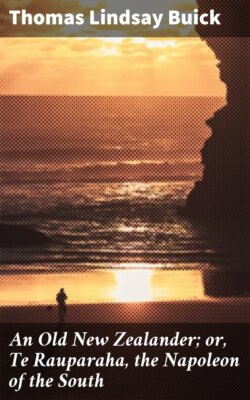Читать книгу An Old New Zealander; or, Te Rauparaha, the Napoleon of the South - Thomas Lindsay Buick - Страница 11
На сайте Литреса книга снята с продажи.
CHAPTER IV
THE LAND OF PROMISE
ОглавлениеTable of Contents
When the period of feasting and enjoyment, which invariably followed upon the return of a successful Maori war party, had terminated at Kawhia, Te Rauparaha immediately became involved in a fresh struggle with Waikato. The cause of the hostility was remote; but, as Waikato had vowed to drive him out, no pretext was too slight upon which to base a quarrel. Thus the killing of one of their chiefs by a Taranaki warrior, to whom Te Rauparaha was related, was sufficient to justify the marching of a large war party against him. Their force advanced in two sections: the one came down the inland track, and the other, which was to actively engage Te Rauparaha, entered Kawhia from the sea. Two pas, Tau-mata-Kauae and Te Kawau, speedily fell before the invaders, and again Ngati-Toa were defeated at the battle of Te Karaka, on the borders of Lake Taharoa, after an heroic struggle, in which it is said that three hundred Ngati-Toa fought more than a thousand Waikatos. These disasters were indeed darkening the outlook for Ngati-Toa, and the position has been graphically described by one native historian, who states that "the losses of the tribe of Te Rauparaha were very great; by day and by night they were killed by Ngati-Pou." Success had also attended the arms of the section of Waikato who, under Te Wherowhero, had swept through the Waipa Valley and across the forest plateau until they reached the Wai-Kawau pa on the sea-coast, just north of the Mokau River. This they stormed and sacked by force of overpowering numbers, and, surfeited with victory, they united with their comrades at Te Karaka, and then triumphantly marched home.
With so many of his pas obliterated and his warriors slain, Te Rauparaha retired upon Te Arawi, a coastal stronghold built upon the summit of a forbidding-looking rock, which at full tide is completely surrounded by a breaking sea. Here he had leisure to reflect upon the lessening radius of his freedom and to formulate his plans for extricating his people from a position of increasing peril; and we may fairly assume that it was now that his final decision to migrate from Kawhia to Kapiti was taken. Once resolved on this course, he applied himself systematically to the task of persuading his people to enter into the spirit of the scheme, over which he himself had become so enthusiastic, and which he now deemed necessary to their safety. The task was by no means a simple one, for the impending danger was not so apparent to all the tribe as it was to their chief; and, moreover, there centred in the spot which he was asking them to leave the traditions and associations of all the centuries which had passed since their forefathers had first landed there from the pilgrim canoe. They knew each nook and corner, from the caves to the hill-tops, every point of which spoke to them of the beloved past. Here a rock which had been a trysting-place in some tragic love affair, there a haunt of spirits, yonder a burying-ground made sacred by the bones of their ancestors, and there again a battlefield hallowed by the memory of the fallen. Each of these was a tie dear to the Maori; and they were loath to leave all that linked them to the past and face a future full of doubt and uncertainty.
But the confidence which Te Rauparaha had inspired, and the prospect of guns and ammunition in abundance, gradually overcame these sentimental objections; and before long the Ngati-Toa people agreed to follow their chief whithersoever he might lead. Te Rauparaha was, however, prudent enough to recognise that his own section of the tribe, though brave at heart, were few in numbers for so serious an undertaking as the conquest of a new territory. As soon, therefore, as he had secured the consent of his own tribe, he paid a visit to Maungatautari, for the purpose of obtaining the co-operation of Ngati-Raukawa. With them he was no more successful at first than he had been with his own people. He pointed out their liability to attack, the difficulty in obtaining guns, shut out as they were from communication with the whalers, and the prospect of an easy victory over the weakened tribes of the coast. But they were reluctant to give up all that they possessed for a visionary and problematical success, and it was not till quite a year later that he was able even partially to break down their resistance. In pressing his claims upon the Ngati-Raukawa, he was materially aided by a somewhat romantic incident which occurred during his stay at Maungatautari. Although his mother was a Ngati-Raukawa woman, and by virtue of that fact he could claim chieftainship amongst them, Te Rauparaha was not regarded as a particularly brilliant star in their peerage; but what he lacked in pedigree was more than compensated for by his mental initiative and personal courage. Conscious of his own power, he never lost an opportunity of impressing it upon others; and it is therefore not a matter for surprise that he made the death of the Ngati-Raukawa chief the occasion of advancing his own claims to leadership.
